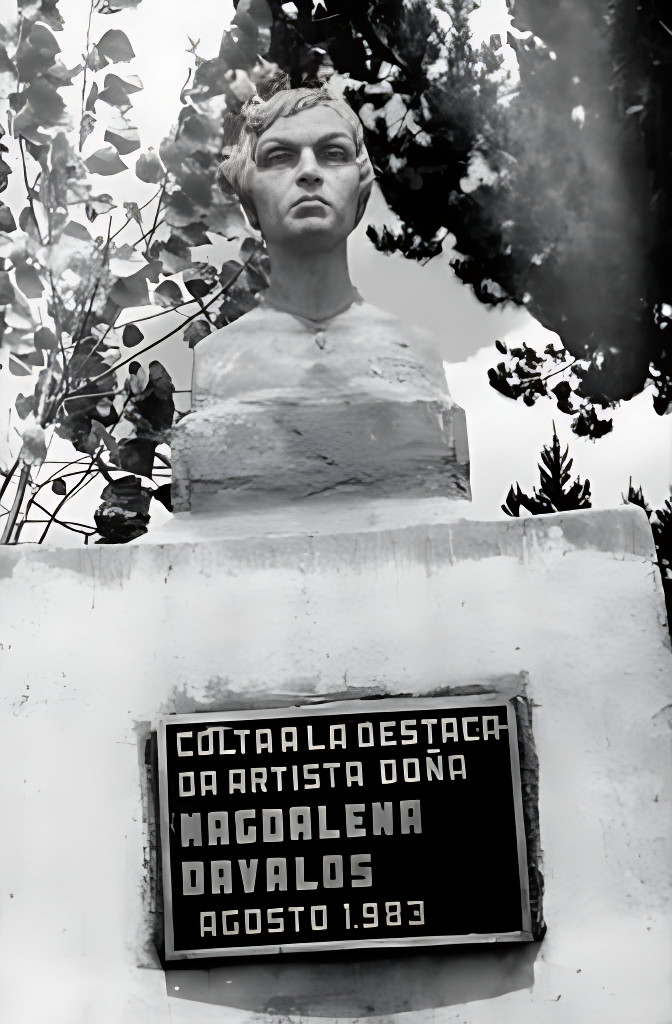Magdalena Dávalos y Maldonado (Chambo or Colta, 1725 – Guano, January 8, 1806) was an Ecuadorian scholar, literary figure, and talented artist in both painting and music, active during Ecuador’s Spanish colonial era. Her notable accomplishments are underscored by her distinction as the sole female member of the Escuela de la Concordia, also known as the Patriotic Society of the Friends of the Country of Quito (Sociedad Patriótica de Amigos del País de Quito). This influential literary society, founded by Eugenio Espejo, played a pivotal role in promoting Enlightenment thought and nurturing nationalistic sentiments in Spanish South America. Magdalena’s inclusion in this esteemed society highlights her exceptional intellect, education, and literary prowess, defying prevailing gender norms and leaving an enduring impact on Ecuador’s intellectual and cultural landscape. Today, her legacy is honored in Riobamba, where the city has dedicated one of its most significant schools and a small street in her memory, acknowledging her profound contributions to the arts and intellectual development of the region.
Introduction
Magdalena Dávalos y Maldonado (1725-1806) was a renowned Ecuadorian scholar and literary figure known for her academic knowledge, education, and literary talents. She held a prominent position as the only female member of the influential literary society, Escuela de la Concordia, which played a crucial role in promoting Enlightenment thought and nationalism in Spanish South America.
Early Life and Family Background
Magdalena Dávalos y Maldonado was born in either Chambo or Colta, two communities near Riobamba, Ecuador, in 1725. She was the fourth daughter of General José Dávalos Sotomayor y Villagómez and Rosa Elena Maldonado Sotomayor y Palomino. Her mother was the sister of Ramón Maldonado Sotomayor y Palomino, the first Marquess of Lises. Magdalena was baptized on February 9, 1725, in her birthplace, where her parents owned several haciendas.
Influential Family and Cultural Environment
Magdalena Dávalos y Maldonado came from a family that valued culture and education. Growing up in an intellectually stimulating environment alongside her siblings, she developed her artistic and cultural abilities. She excelled in literature, music, and painting, showcasing her exceptional talents and becoming a highly educated woman. Her family’s influence, coupled with her own dedication, allowed her to flourish in various artistic endeavors and gain proficiency in languages, including French.
Marriage and Descendants
In 1738, Magdalena married Juan Manuel de Lizarzaburu, a member of a prominent family with a significant role in Ecuadorian history, particularly in Riobamba. They had one son, José Antonio de Lizarzaburu, who later played a pivotal role in the reconstruction and resettlement of the city of Riobamba after the devastating earthquake of February 4, 1797. José Antonio’s son, Ignacio José de Lizarzaburu, became a notable figure in Ecuador’s struggle for independence.
Membership in the Escuela de la Concordia
Magdalena Dávalos y Maldonado joined the Patriotic Society of the Friends of the Country of Quito (Sociedad Patriótica de Amigos del País de Quito), also known as the Escuela de la Concordia (School of the Concord), in November 1791. This society, founded by Eugenio Espejo, had a mission to promote agriculture, arts, industry, and the discreet dissemination of new political ideas. With a membership of 25 influential individuals, including notable figures like Miguel de Jijón y León and Juan José Guerrero y Matheu, the society served as a platform for intellectual discourse and cultural development. One of their notable achievements was the publication of the newspaper “Primicias de la Cultura de Quito,” which addressed significant social and cultural issues of the time and circulated within the Royal Audience of Quito. Magdalena’s inclusion as the only female member not only highlights her exceptional intellectual prowess but also speaks to the recognition she received within this esteemed literary society.
While the School of Concord had a short existence (1791-1793), its significance reverberates in Ecuadorian history as a pivotal precursor and herald of local resistance that ultimately led to Ecuador’s independence, which transferred political power from the Spanish to local creole elites.
The School of Concord, despite its brief existence from 1791 to 1793, occupies a significant place in Ecuadorian history as a pivotal precursor and herald of local resistance. It stands as a remarkable testament to the struggle for independence, which ultimately resulted in the transfer of political power from the Spanish to local creole elites in Ecuador.
Contributions and Cultural Legacy
Magdalena Dávalos y Maldonado’s intellectual capabilities were widely acknowledged by renowned scientists and intellectuals of her time. Notably, Charles Marie de La Condamine, a member of the French Geodesic Mission, referred to her and her two sisters, María Estefanía and María Josefa, as “the French muses of the province of Quito” due to their artistic virtues, extensive knowledge, and proficiency in the French language. Magdalena’s cultural and artistic achievements left a lasting impact on the society of her time.
Passing and Philanthropic Endeavors
Magdalena Dávalos y Maldonado passed away on January 8, 1806, in her estate in Elén, Guano. She was buried in Riobamba’s San Francisco Church, which was constructed with the support of her son, José Antonio. Apart from her literary and artistic pursuits, Magdalena was also known for her philanthropic endeavors, offering protection and assistance to those in need.
Conclusion
Magdalena Dávalos y Maldonado, an Ecuadorian scholar and literary figure, contributed significantly to the cultural and intellectual landscape of her time. As the only female member of the Escuela de la Concordia, she challenged societal norms and made a lasting impact on the promotion of Enlightenment thought and nationalism in Spanish South America. Her multifaceted talents and dedication to the arts, literature, and education serve as a testament to her enduring legacy in Ecuadorian history and the broader realm of intellectual pursuits.

